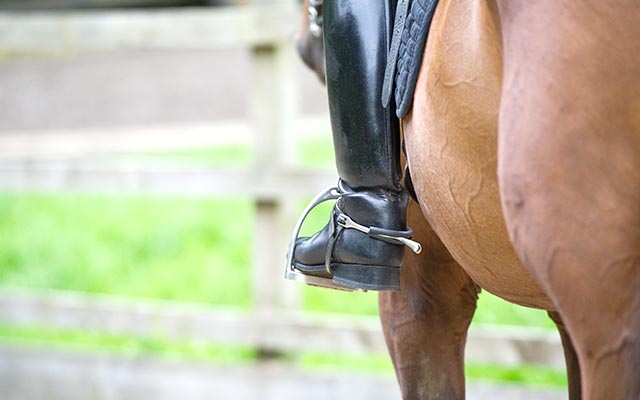The three US event riders who tested positive for banned stimulants last autumn have been suspended from competition for a year and fined CHF 1,500 (£1,350) each.
The three riders — Hannah Sue Burnett, Jennie Brannigan and Alyssa Phillips — were all tested at the Ocala Jockey Club International in Florida last year (16-20 November), where Hannah Sue won the CIC3* on Harbour Pilot. All three recorded a positive result for the prohibited substance amfetamine, with Alyssa also testing positive for canrenone and Jennie for methylphenidate and ritalinic acid.
Amfetamine and methylphenidate are listed in the stimulants category of the World Anti-Doping Agency (WADA) 2017 prohibited list, as is phenethylamine and its derivatives, which include ritalinic acid. Canrenone is included in the diuretics and masking agents category.
Under the terms of the agreements between the FEI and the riders, the trio are suspended from competition for a year from the date of the sample collection (18 November 2018), have to pay the fine and are disqualified from the competition. The parties each bear their own legal costs.
The riders also have to support the FEI’s anti-doping campaign and engage in athlete education, including providing testimonials for FEI education material. They also have to complete an anti-doping education course within a year of the FEI Tribunal decision.
Athletes can apply for Therapeutic Use Exemptions (TUEs) if they need to use a prohibited substance to manage an illness or condition. The riders all applied for a retroactive TUE after the tests, which were rejected, but they have all been granted TUEs for the same substances going forward.
“All three athletes were able to prove no significant fault or negligence and the circumstances of the cases show that none of them had the intention to dope,” said FEI legal director Mikael Rentsch. “In light of this, and the fact that the athletes have subsequently been granted Therapeutic Use Exemptions for these medications, the parties agreed that the period of ineligibility should be reduced to 12 months [from a potential four years], and the FEI Tribunal has approved that.”
Continued below…

Dope testing: what is it and how does it work?
Find out everything about dope testing and how you can avoid an accidental positive test

Protecting people, horses and the sport: why clean sport week applies to you
‘It is vital that everyone participating within equestrian sport fully understands the importance of clean sport’

Warning to competitors after riders fail dope tests
‘It is your responsibility to know if you are taking any medications on the FEI prohibited substance list’
Detail of decisions and response: Hannah Sue Burnett
Hannah Sue requested the analysis of the B sample after her positive test, which confirmed the A sample analysis and the presence of amfetamine.
The FEI Tribunal reported Hannah Sue has had a “genuine and documented history of ADHD [attention deficit hyperactivity disorder] since childhood”, the condition being so disruptive she dropped out of school at 12 years old and was home schooled and subsequently dropped out of college. Amfetamines are commonly used to treat this condition.
“There was no intent by Ms Burnett to cheat or enhance performance and she was granted a prospective TUE for her ADHD condition,” continued the document. “Therefore, Ms Burnett’s fault lies not in taking the medication, but in failing to file a timely TUE application.”
The report also said that Hannah Sue has committed herself to educating herself about ADHD and starting psychotherapy for behavioural support around organisational skills and time management, as well as taking her prescribed medication.
Hannah Sue, who told the FEI she cannot recall receiving any human anti-doping education for at least five years, said after the Tribunal decision: “It is with the upmost passion and commitment that I will be returning to the competitive world of eventing. I have taken full responsibility for my actions and am grateful for the opportunity to return to the sport I so deeply love.
“Abiding by the rules that have been placed to ensure fair competition within the sport of eventing is important to me. While I am taking a doctor prescribed medication, I acknowledge and regret that I began taking the medication before submitting a Therapeutic Use Exemption. I have since gone through the FEI process and been granted a TUE going forward.
“I am humbled by the support and forgiveness of those closest to me despite my mistakes. To everyone who fought for me and believed in me when I couldn’t do so for myself — from the bottom of my heart, thank you. I know it will take time to rebuild the trust of many of my fans and supporters, but I am committed to doing exactly that.”
Detail of decisions and response: Jennie Brannigan
Jennie did not request the analysis of the B sample. The Tribunal report said she had “struggled with depression, attention issues, as well as ADHD symptoms for her entire life (as they are quite prevalent in her family history), but did not seek help through medication until she sustained head injuries / concussions in the past two years.” It also said that she provided documentation showing her concussion history “at times makes her forgetful and impulsive”.
Jennie, who had never previously been drug tested, was initially treated for depression and attention issues with Wellbutrin, which is not prohibited, but was moved onto Concerta and Vyvanse after Wellbutrin did not resolve her issues. Her Concerta and Wellbutrin use were declared on her doping control form.
“Ms Brannigan’s use of these medications was unrelated to her sport performance, but rather, was to treat her ADHD symptoms as well as depression. Ms Brannigan promptly admitted her anti-doping rule violation, promptly provided an explanation as to the cause of her positive test, and waived the testing of her B sample,” said the report, which added that: “Other tribunals have also held that depression is a factor that can lead to a reduction in a sanction.”
Jennie said: “I’m incredibly happy to know that I will be able to come back to compete again this November, and while this situation has been tough on my sponsors, students, owners, and support team I am truly thankful that I have learned how to love the sport even from the sidelines. I am grateful to everyone who has stood by me and I am extremely sorry to have let our sport, country, and my supporters down.
“That being said, I am appreciative to the FEI for recognising I wasn’t taking the medication to try to improve my performance and that indeed I will be allowed to compete on this medication going forward. I know I have learned a lot from this experience, and I hope it has helped others be more educated on anti-doping as well.”
Detail of decisions and response: Alyssa Phillips
Alyssa did not request the analysis of the B sample. She declared the two substances — canrenone and amfetamine — on her doping control form at the time of the test, which is seen as “a mitigating factor that weighs in her favour when assessing her degree of fault”.
The Tribunal also took into account Alyssa’s youth (she is 21), the fact she is an amateur rider and full-time college student and her lack of anti-doping education — “before she was tested she had no idea an anti-doping programme even existed for riders and this was her first ever doping test”.
The report added that the positive test was caused by medications for ADHD, for which Alyssa has a valid medical prescription and which she believed she was permitted to use. “Ms Phillips’s use of these medications was unrelated to her sport performance, but rather, was to treat her ADHD symptoms,” it said.
Alyssa said: “Today FEI made public that I have been given the minimum sanction possible of 12 months for my ingestion of two prescribed medications, that are banned substances. As most of you may recall, I tested positive for the two prescribed medications at a competition back in November. At the time, I didn’t understand that riders were subject to an anti-doping programme, I thought only horses were.
“I should’ve known to apply for a TUE for my two medications, but I was not aware I needed to. However, I have since applied and both medicines have received a TUE. With that being said, the FEI understood I was not trying to enhance my performance in any way and has granted me a sanction of 12 months backdated to when I was tested in November. So, I will be eligible to compete again on November 18, 2018.
“Despite my ineligibility to compete, I am grateful to be surrounded by people that have supported and continue to support me during this time, along with three happy and healthy horses. I have taken advantage of my time off to really focus on the training and ride-ability of my horses. I am staying positive and using this unfortunate situation as an opportunity to learn and grow as a rider.”




